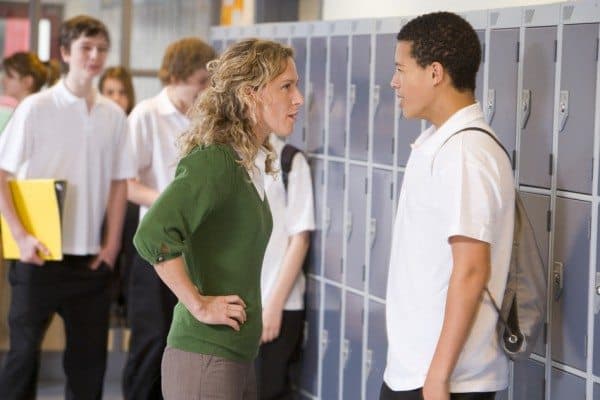
Dear Teacher: My Disabled Child Is Not Lazy
There’s a lot of talk in the disability community about how we talk about it; person-first language, for example, tends to be a hot button in the autism community. Is my child autistic or is he a person with autism? Does it matter how I say it (some people say yes, absolutely, others say it’s personal preference)? For those of us parenting kids with disabilities, there is a constant push-pull happening in terms of what it’s “okay” to say. Is it okay to say that you love your child but hate their disability? Is it disrespectful or demeaning to say that? Again, opinions vary.
I am raising two fantastic human beings whom I love more than anything else on this planet. Both of them have disabilities, and because those disabilities are neurological and mental-health related, I am accustomed to a whole host of misconceptions about my children, their challenges, my parenting, and what other people assume we “should” be doing at any given time. This happens in real life and it happens online because I write about it. It happens with people we know and with strangers. It’s complicated and often messy, and I second-guess myself all the time, and I often wish I could take away some of the pain these challenges bring to my kids’ lives, because of course I wish life was a little easier than it often seems to be around here.
Here’s a handy and relatively non-threatening line I like to throw out there: Just because you can’t see it, doesn’t mean it doesn’t exist. There’s a reason some things are called invisible disabilities. And if pressed, sure, I’m happy to get into the science. Autistic brains are structurally different from their neurotypical counterparts, for one thing. For anyone who thinks prior difficulties are a “poor excuse” for current struggles, check it: childhood trauma changes brain structure, as does PTSD at any age, actually. While the specifics are nobody’s business unless my kids choose to share them, their brains are different. That’s just how it is.
My children are more than their disabilities
Our approach here is to emphasize that challenges are to be recognized and met with as much grace as possible, and they’re never an excuse to stop trying. I push them harder than anyone else—while doing my best to put appropriate supports in place and honor their limitations—and so, over time, I’ve grown used to judgments and misunderstandings, but I remain baffled by those who seem to believe anything that happens here is somehow related to laziness.
Today a teacher at my kids’ high school told one of my kids to “stop using your IEP as a crutch.” And let me be very clear: I don’t dislike this teacher (at least, I didn’t before I heard about this…). My kid doesn’t dislike this teacher. But that statement stung and, once shared with me, made me really think about how misunderstood kids like mine are going to be their entire lives, even by people who “should know better.”
I’m really, really angry right now (spoiler alert: strong language ahead).
Here’s what I want to tell that teacher (and likely will, face to face, very soon):
1) People with broken legs use crutches because that’s the reasonable and appropriate way to compensate for their injuries. Students with disabilities are served under IEPs because that’s the reasonable and appropriate way to compensate for their differences. If you wouldn’t tell a kid with a broken leg to get rid of their crutches, you shouldn’t tell a kid with an IEP that it’s a crutch. I mean, unless you’re a complete asshole.
2) Just like those crutches for broken legs, IEPs exist to serve a specific purpose in light of specific needs. You can’t just get one for the heck of it, nor can you be afforded any accommodation at all without it being assessed and agreed upon as necessary.
3) IEPs are not, in fact, optional! Following them is federal law, regardless of your personal feelings about their necessity. Editorial comments are unneeded, unwanted, and just plain unkind.
4) My children, and all other people with disabilities, already have it harder than most. They already fight (unwarranted) feelings of shame for the ways in which they struggle. Don’t ever suggest to a human being in that situation that they aren’t trying hard enough. If you had any understanding of how hard they work every damn day to function so well that you can have the ignorant luxury of assuming they’re fine, you’d be mortified by your flippant comment.
5) For every kid who has a parent like me who’s going to crawl right up your butt when you make a misstep like this, there are a dozen more struggling kids whose parents either don’t know, don’t care, or have other life circumstances preventing them from advocating for their needs. Rather than being annoyed by being called out, maybe take a minute to truly reflect on not just your behavior, but your mindset. I assume you became a teacher because you care about education and the future of our country. News flash—disability exists whether you believe in it or not, and in larger numbers than you think. You have a responsibility to all of your students, not just the ones who work in a way you understand. Act like it.
Okay, then.
(I’m available for parties, but only if you want to clear ’em out, I guess.)
More on Special Education From Alpha Mom:
- Navigating the World of Special Education Preschool
- A Commonsense, Non-Scary Guide to Your First IEP Meeting
- Special Needs Services: Public, Private or Both?

